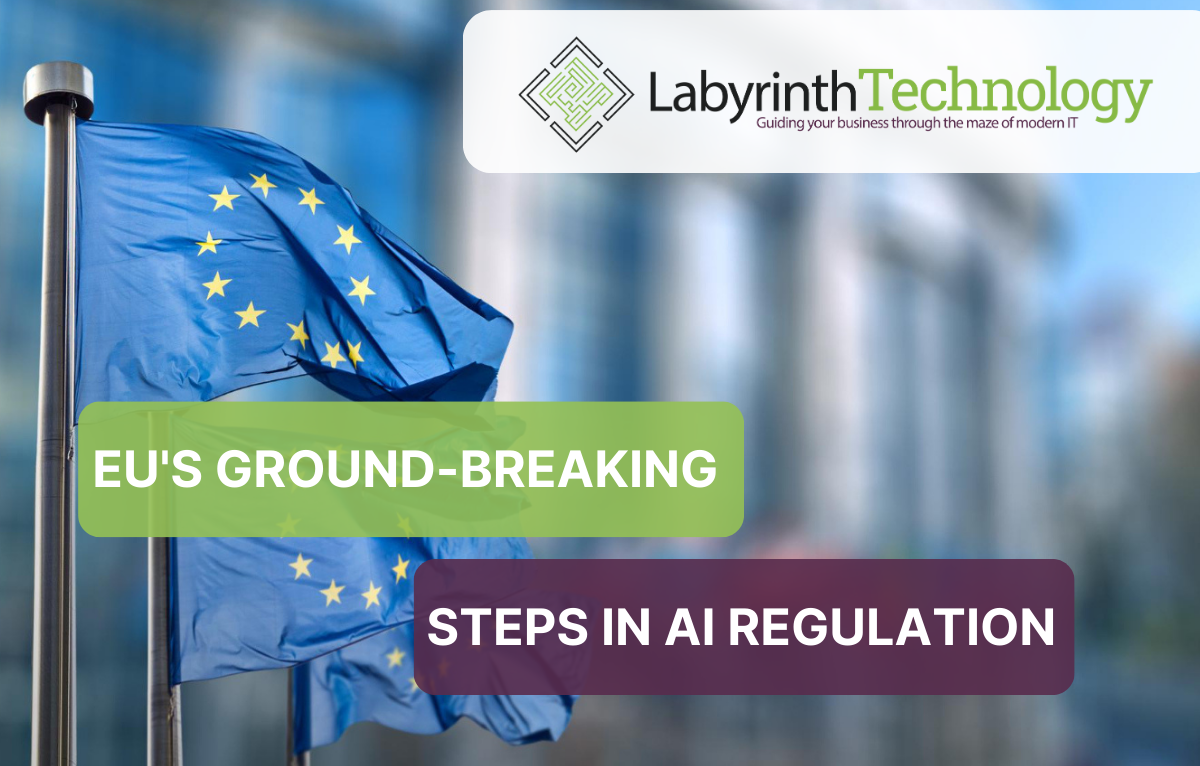
Artificial Intelligence (AI) is swiftly moving from a futuristic concept to an integral part of our everyday lives. Once just a buzzword, this powerful technology is now a dynamic force, seamlessly integrating into everything from our online shopping experiences to the way we interact on social media. Given its quick growth and increasing role in our lives, it’s really important that there are rules to make sure AI is used in a good and safe way.
The European Union is ahead of the game, creating the first major laws to control AI technologies like ChatGPT and DALL-E. The EU is working on laws to make sure that AI develops in a way that is safe, respects our rights, and follows moral standards. This is a big deal because other big players like the USA, UK, and China are also trying to figure out how to handle AI. In this blog post, we’re going to look at the big steps the EU is taking to control AI, aiming to create a future where this technology not only brings new opportunities but also remains fair and safe for everyone.
At its core, AI involves sophisticated software capable of learning and problem-solving in a manner akin to human intelligence. From virtual assistants like Siri and Alexa to algorithms determining social media feeds, AI has a huge impact on everything. However, its rapid development brings forth concerns ranging from potential misuse in cyber attacks to ethical considerations like bias replication.
One of the primary technical concerns with AI is its reliability. AI systems, although sophisticated, are not infallible. They are dependent on the data they are trained with. If this data is limited or biased, the AI’s decisions and actions can be flawed. This limitation can lead to errors in critical areas like healthcare or finance, where AI-driven decisions have significant impacts. Moreover, as AI becomes more integrated into complex systems, ensuring that these systems can effectively communicate and work together becomes a challenge. The more complex the system, the harder it is to predict and control how AI will behave in different scenarios.
AI poses unique challenges in the realm of cyber security. AI systems, with their ability to process and analyse vast amounts of data quickly, are attractive targets for cyber attacks. Hackers can exploit vulnerabilities in AI systems to access sensitive information, manipulate data, or even take control of the AI itself. There’s also the risk of AI being used to create sophisticated phishing attacks or to automate the generation of fake news and misinformation at an unprecedented scale.
Another significant concern is data privacy. AI systems require large amounts of data to learn and make decisions. This often involves collecting personal information, raising concerns about how this data is used and who has access to it. The potential for misuse of personal data by AI systems, whether intentional or accidental, is a real threat to individual privacy.
The EU’s provisional agreement on AI laws marks a historic milestone. These laws aim to balance innovation with critical safeguards, protecting consumer rights and imposing limitations on law enforcement’s use of AI. The anticipated AI Act, set for a vote in the European Parliament, represents a holistic approach to AI governance, addressing everything from consumer complaints to environmental impacts. There’s a provision for consumers to file complaints and the potential for imposing fines for violations, emphasising consumer protection and accountability.
European Commission President Ursula von der Leyen emphasised that the AI Act aims to foster technology development without compromising people’s safety and rights. It’s about creating a framework for trustworthy AI. Although the European Parliament will vote on these proposals early next year, any resulting legislation won’t be effective until at least 2025. This timeframe allows industries and stakeholders to prepare for the upcoming changes.
At a recent global summit hosted by the UK, world leaders and tech giants, including Elon Musk, discussed AI’s safe usage. The resultant Bletchley Declaration, signed by 28 nations, acknowledges both the benefits and risks of AI, committing to collaborative efforts for trustworthy and safe AI development.
As the EU leads the way with these regulatory measures, the global community watches and learns. The EU’s balanced approach to AI regulation is not just about risk management; it’s an opportunity for innovation, ethical advancement, and global leadership in technology. This initiative by the EU serves a dual purpose. Firstly, it establishes a benchmark for global AI standards, ensuring that new technological developments align with the core values of human rights and public safety. Secondly, it kindles a spirit of ethical innovation, where technology developers are encouraged to create AI solutions that are not only efficient and cutting-edge but also respect human rights and public safety.
The EU’s decisive action in creating regulation for AI serves as a call to action for countries around the world. We are entering an era where AI plays a significant role in our daily lives. These new EU guidelines act as a guiding light, helping us navigate how AI can benefit us without compromising our principles and rights. We are at a crucial juncture in the evolution of AI, a time where we need to strike the right balance between fostering innovation and upholding ethical standards. The EU’s new regulation would ensure that as AI reshapes our world, it does so in a manner that benefits humanity and safeguards our environment. This moment presents us with an opportunity to shape AI into a tool that serves the greater good, not only for our current era but for future generations as well.
Empowering London Businesses with Efficient IT Solutions to Save Time and Stay Ahead of the Competition.